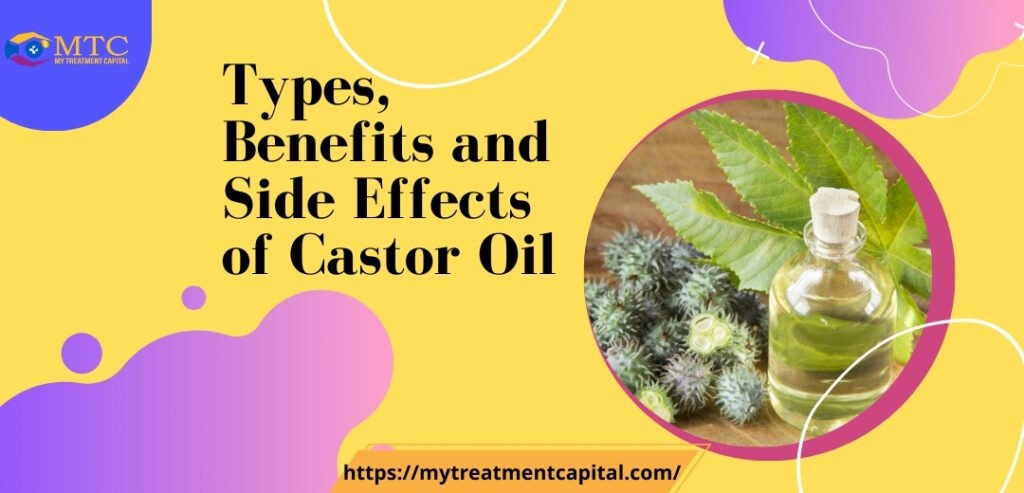Castor oil comes from the seeds of the castor bean plant. It’s been used for a long time because it has many good things in it. Even though it might smell strong and feel thick, castor oil is helpful for your skin, hair, and more.
In this article, we’ll talk about how castor oil can make your health, skin, and hair better. You’ll learn why many people like using it and how it can help you too. Let’s start exploring the Castor oil benefits in a simple way.
Extraction Process of Castor Oil
To make castor oil, people use the seeds from the castor bean plant. Here’s how it’s done:
- Harvesting: First, they collect the seeds from the castor bean plant.
- Cleaning: Then, the seeds are cleaned to remove any dirt or debris.
- Drying: After cleaning, the seeds are dried in the sun or using machines to remove excess moisture.
- Pressing: Next, the dried seeds are pressed to extract the oil. This pressing squeezes out the oil from the seeds.
- Filtering: The oil is then filtered to remove any remaining particles, making it clear and pure.
- Packaging: Finally, the castor oil is packaged and ready to be used.
This simple process turns castor bean seeds into the beneficial oil that many people use for various purposes.
Different Types of Castor Oil are Commercially Available.
Castor oil comes in a few different types. Here are the main ones:
Cold-Pressed Castor Oil
This type is made by pressing castor beans without using heat. It keeps more of the natural nutrients intact.
Refined Castor Oil
Refined castor oil goes through a process to remove impurities and odors. It’s usually lighter in color and has a milder scent compared to unrefined castor oil.
Organic Castor Oil
This type is made from castor beans grown without pesticides or chemicals. It’s a good choice if you prefer natural products.
Jamaican Black Castor Oil
This variety is made by roasting castor beans before pressing them. It’s known for its dark color and strong, nutty aroma. Some people believe it has extra benefits for hair growth.
These are the main types of castor oil you might come across. Each one has its own qualities, so you can choose the type that suits your needs best.
Health Benefits
Castor oil offers several health benefits, making it a valuable addition to your wellness routine:
Skin Benefits
Castor oil offers several advantages for maintaining healthy skin:
Moisturizing
Castor oil is packed with fatty acids, such as ricinoleic acid, that help lock in moisture. When applied to the skin, it forms a protective barrier, preventing water loss and keeping the skin hydrated. This moisture retention helps combat dryness, flakiness, and rough patches, leaving the skin feeling soft and smooth.
Reducing Inflammation
One of the key benefits of castor oil is its ability to reduce inflammation. It contains compounds with anti-inflammatory properties that can calm irritated skin and alleviate redness and swelling. Whether you’re dealing with minor irritations, such as razor burns or insect bites, or more chronic conditions like eczema or psoriasis, applying castor oil can provide soothing relief.
Fighting Acne
Despite its thick texture, castor oil is surprisingly beneficial for acne-prone skin. It possesses antimicrobial properties that help eliminate acne-causing bacteria, reducing the risk of breakouts. Additionally, its anti-inflammatory properties can help decrease the size and redness of existing pimples. Regular use of castor oil as part of your skincare routine may lead to clearer, healthier-looking skin over time.
Hair Benefits
Castor oil offers several advantages for your hair. Let’s delve into how it can benefit your hair health:
Promotes Hair Growth
Castor oil contains nutrients that help nourish the hair follicles, promoting healthy hair growth. By applying castor oil to your scalp regularly, you can encourage faster and stronger hair growth.
Strengthens Hair
Weak hair is prone to breakage and split ends. Castor oil penetrates deep into the hair shaft, strengthening it from within. This helps prevent breakage and keeps your hair looking fuller and healthier.
Improves Hair Texture
Castor oil has moisturizing properties that can improve the texture of your hair. It adds moisture to dry, brittle hair, making it softer and more manageable. Regular use of castor oil can also add shine to your hair, giving it a healthier appearance.
Soothes Scalp
If you suffer from an itchy or dry scalp, castor oil can provide relief. Its moisturizing properties soothe the scalp, reducing itching and irritation. Additionally, castor oil helps balance the scalp’s natural oil production, which can help alleviate dandruff and other scalp conditions.
Incorporating castor oil into your hair care routine can lead to noticeable improvements in the health and appearance of your hair. Whether you’re looking to stimulate hair growth, strengthen your strands, or soothe your scalp, castor oil offers a natural and effective solution.
Medical Uses
Castor oil has several medical benefits beyond its cosmetic uses. Here are some ways it can help:
Relieves Constipation
If you’re having trouble going to the bathroom, castor oil can act as a gentle laxative. It helps to stimulate bowel movements and ease discomfort in your stomach.
Reduces Joint Pain
Applying castor oil to achy joints can provide relief from pain and inflammation. It works by penetrating deep into the tissues and soothing soreness, making movement easier and more comfortable.
Soothes Skin Conditions
Castor oil’s anti-inflammatory properties make it effective in soothing various skin conditions like dermatitis, eczema, and psoriasis. It helps to reduce itching, redness, and irritation, promoting healing and comfort.
Promotes Wound Healing
Due to its antibacterial and moisturizing qualities, castor oil can aid in wound healing. It creates a protective barrier over the wound, preventing infection while keeping the skin hydrated and promoting tissue regeneration.
Treats Fungal Infections
Castor oil’s antifungal properties make it useful in treating fungal infections like athlete’s foot and ringworm. Applying it to affected areas can help alleviate itching, reduce inflammation, and fight off the infection.
Supports Eye Health
Some people use castor oil as an eye drop to help with dry eyes or to promote eyelash growth. It’s believed to provide lubrication to the eyes and nourishment to the eyelashes, keeping them healthy and strong.
DIY beauty and skincare recipes.
Here are some recipes.
Moisturizing Face Mask
- Mix 1 tablespoon of castor oil with 1 tablespoon of honey.
- Apply the mixture to your face and leave it on for 15-20 minutes.
- Rinse off with warm water for soft and hydrated skin.
Nourishing Hair Mask
- Combine 2 tablespoons of castor oil with 1 tablespoon of coconut oil.
- Massage the mixture into your scalp and hair, focusing on the ends.
- Leave it on for 30 minutes to an hour before washing it out for shiny and healthy-looking hair.
Gentle Eye Makeup Remover
- Dip a cotton pad into a small amount of castor oil.
- Gently wipe the pad over your closed eyelids to remove makeup without harsh chemicals.
Lip Balm
- Mix equal parts of castor oil and beeswax pellets.
- Heat the mixture until melted, then pour it into small containers.
- Let it cool and solidify for a natural lip balm that keeps your lips moisturized.
Cuticle Oil
- Apply a small amount of castor oil to your cuticles and nails.
- Massage gently to promote nail growth and keep your cuticles healthy.
These simple DIY recipes use castor oil to create effective beauty and skincare products using everyday ingredients. Incorporating these recipes into your routine can help you achieve natural and nourished skin and hair.
Learn this for Health: Is Peanut Butter Good for Health?
Side effects of Caster Oil
There are some side effects of Castor Oil as well.
Upset Stomach: Taking large doses of castor oil may lead to stomach discomfort, cramping, and diarrhea. It works as a laxative, so using too much can cause digestive upset.
Skin Irritation: Direct application of castor oil to the skin can sometimes cause irritation or allergic reactions, especially in individuals with sensitive skin. It’s advisable to perform a patch test before using it extensively.
Dehydration: The laxative effect of castor oil can lead to increased bowel movements, potentially resulting in dehydration if adequate fluids are not consumed. It’s crucial to drink plenty of water when using castor oil as a laxative.
Miscarriage Risk: Pregnant women should avoid using castor oil orally or topically, as it may stimulate uterine contractions and pose a risk of miscarriage. Consultation with a healthcare provider is recommended before using castor oil during pregnancy.
Interference with Medications: Castor oil may interact with certain medications or medical conditions. It’s important to consult a healthcare professional before using castor oil, especially if you’re taking other medications or have underlying health issues.
If you experience any adverse reactions or discomfort after using castor oil, discontinue use and consult a healthcare provider. It’s essential to use castor oil responsibly and in moderation to minimize the risk of side effects.
Conclusion
Castor oil is great for your skin, hair, and health. It helps moisturize skin, promotes hair growth, and relieves constipation. But be careful, using too much can upset your stomach or cause skin irritation. Pregnant women should avoid it. Always talk to a doctor before trying new remedies. Enjoy the benefits of castor oil, but use it safely.
Frequently Asked Questions
Q. What is castor oil, and where does it come from?
Ans. Castor oil is a vegetable oil derived from the seeds of the castor bean plant, scientifically known as Ricinus communis. It has been used for various purposes for centuries due to its beneficial properties.
Q. What are the benefits of using castor oil for skin and hair?
Ans. Castor oil is known for its moisturizing properties, making it beneficial for dry skin and hair. It can also promote hair growth, strengthen hair follicles, and soothe scalp irritation. Additionally, it has anti-inflammatory and antimicrobial properties that can help with skin conditions like acne and dermatitis.
Q. How do I use castor oil for hair growth?
Ans. Castor oil can be applied directly to the scalp and massaged in gently. Leave it on for at least 30 minutes or overnight before washing it out with shampoo. Some people also mix it with other oils like coconut or olive oil for added benefits.
Q. Can castor oil be used as a laxative?
Ans. Yes, castor oil is commonly used as a natural laxative to relieve constipation. However, it should be used with caution and in moderation, as excessive consumption can lead to stomach upset and dehydration.
Q. Is castor oil safe for sensitive skin?
Ans. While castor oil is generally considered safe for most skin types, individuals with sensitive skin may experience irritation or allergic reactions. It’s recommended to perform a patch test before using it extensively and to dilute it with carrier oil if necessary.
Q. Are there any side effects or risks associated with using castor oil?
Ans. Some potential side effects of castor oil include stomach upset, diarrhea, skin irritation, and allergic reactions. Pregnant women should avoid using castor oil internally, as it may stimulate uterine contractions. Additionally, it’s important to use castor oil responsibly and in moderation to minimize the risk of adverse effects.




